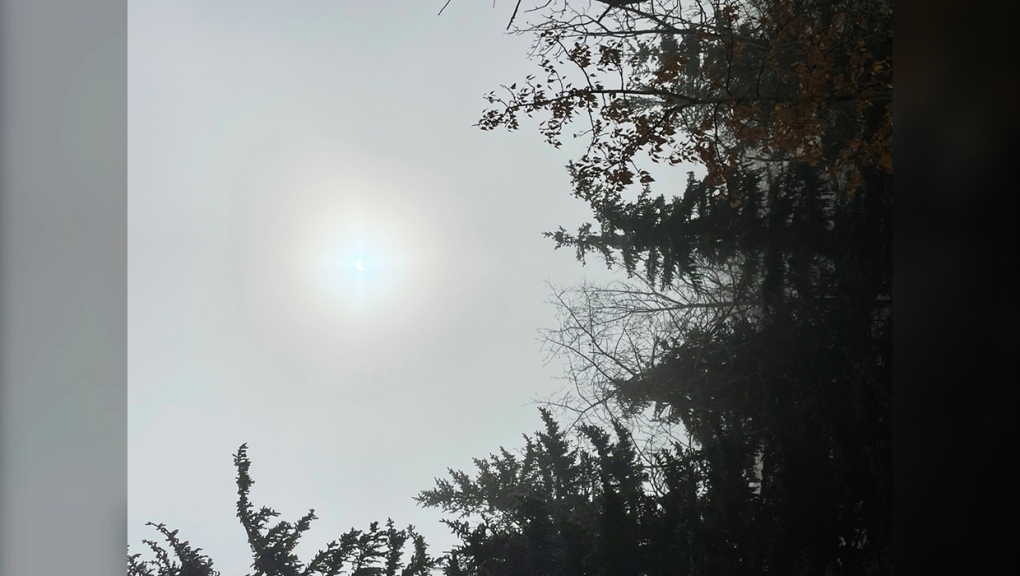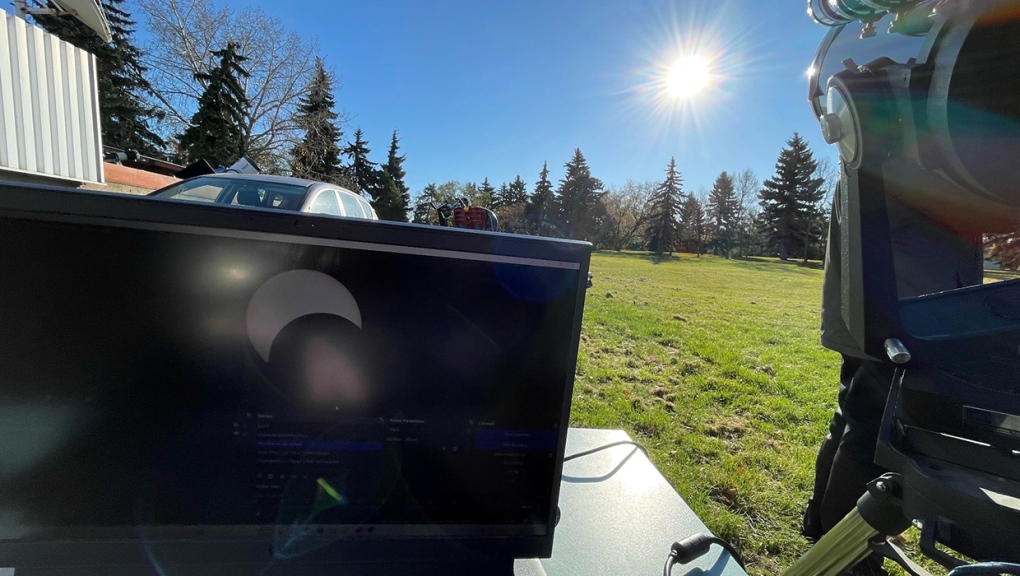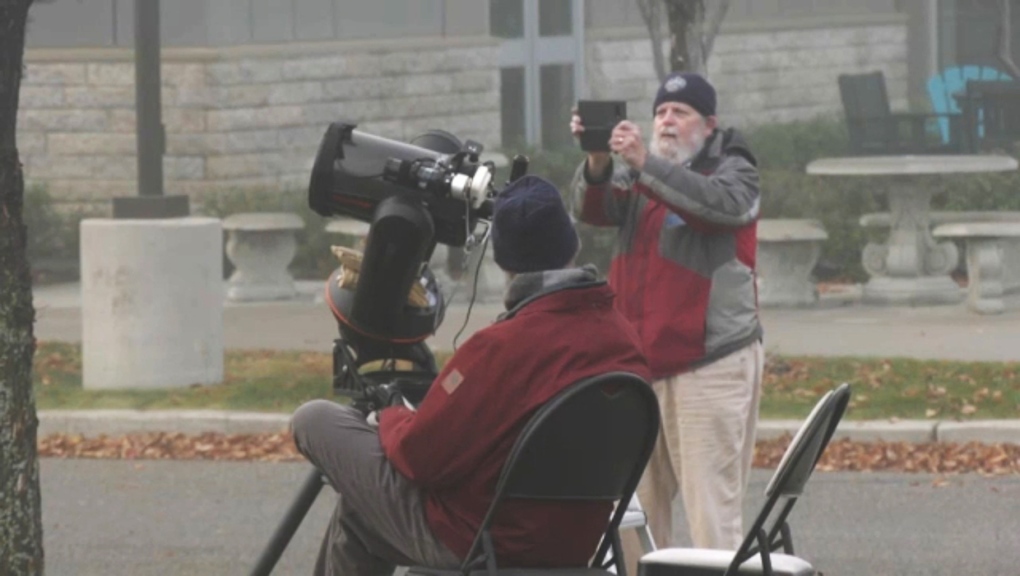Astronomy buffs partner with Ambrose University for annular eclipse viewing party
 A view of Saturday's annular solar eclipse shot in Edmonton on Oct. 14, 2023. (Photo: Amanda Anderson, CTV Edmonton)
A view of Saturday's annular solar eclipse shot in Edmonton on Oct. 14, 2023. (Photo: Amanda Anderson, CTV Edmonton)
Ambrose University teamed up with the Royal Astronomical Society of Canada (RASC) to host a viewing party of the annular solar eclipse Saturday.
About 100 people, many of them professors and students, showed up to view the unique eclipse, where the moon passes in front of the sun and blocks its light.
Saturday in Calgary, a dense fog added to the atmospheric drama as the astronomy lovers pointed their telescopes and solar-protected binoculars towards the sky.
 Photo of the partial solar eclipse from Calgary on Saturday, Oct. 14, 2023, shot by Valerie Medvedic
Photo of the partial solar eclipse from Calgary on Saturday, Oct. 14, 2023, shot by Valerie Medvedic
"We only get about 60 per cent of the eclipse," said RASC media coordinator Neel Roberts, "because of the area we're in.
"Bend, Oregon is getting 100 per cent," he added.
Roberts said that the best way to think about Saturday's partial eclipse was a kind of opening act for a bigger solar event next spring.
 Annular solar eclipse, Edmonton, Oct. 14, 2023 (Amanda Anderson, CTV News)
Annular solar eclipse, Edmonton, Oct. 14, 2023 (Amanda Anderson, CTV News)
"The total solar eclipse," he said, "which is coming April 8, 2024 to Canada.
"Starting in Mexico," he said, "going up to the U.S. and coming over the Great Lakes and sailing off to Newfoundland."
Roberts described eclipse viewing as a somewhat haphazard pastime.
 An annular solar eclipse occurs when the moon partially blocks the sun
An annular solar eclipse occurs when the moon partially blocks the sun
"It's kind of a crapshoot," he said. "Unfortunately, most of them are in areas where people don't live – deserts, oceans – but this one is in an inhabited area."
Roberts said he brought solar glasses to the event but didn't actually need them for Saturday's viewing party, because the eclipse didn't have the corona flash, making it safe to view with a naked eye.
 Astronomy buffs at Calgary viewing party Oct. 14, 2023
Astronomy buffs at Calgary viewing party Oct. 14, 2023
A second viewing party was also held Saturday at Telus Spark.
CTVNews.ca Top Stories

Canada closes 'flagpoling' loophole for temporary visa holders
Temporary residents of Canada will no longer be able to utilise the flagpoling process to initiate work or study permits, following a ban from the Canada Border Services Agency.
'The Brutalist,' 'Emilia Perez' triumph at Golden Globes
Brady Corbet's 215-minute postwar epic 'The Brutalist' and Jacques Audiard's Spanish language, genre-shifting trans musical 'Emilia Perez' won top honours at the 82nd Golden Globes on Sunday.
Driver who entered Canada 'without stopping' at B.C. border crossing arrested: police
A man who illegally blew through the Canada-U.S. border crossing in Surrey, B.C., Sunday morning has been arrested, according to authorities.
'Absolutely devastating': Southern Manitoba golf course clubhouse burns for second time in 4 years
A golf course clubhouse in Morden, Man. went up in flames Sunday for the second time in less than four years, and mere days after its reopening from the previous fire was celebrated.
The Vivienne, star of 'RuPaul's Drag Race UK', dies at 32
British reality show 'RuPaul's Drag Race UK' winner James Lee Williams, aged 32, popularly known as The Vivienne, has died.
Thousands are without power due to winter storm hitting Newfoundland and Labrador
Massive waves slammed Newfoundland and Labrador's coastline on Sunday, as a powerful winter storm left thousands without power.
Man responsible for New Year's truck attack previously visited New Orleans, Ontario, Egypt: FBI
The man responsible for the truck attack in New Orleans on New Year's Day that killed 14 people visited the city twice before and recorded video of the French Quarter with hands-free glasses, an FBI official said Sunday.
U.S. beats Finland 4-3 in OT to capture second straight world junior gold
The United States battled back from a 3-1 deficit late in the second period to defeat Finland 4-3 and secure the country's second straight world junior hockey championship Sunday.
Driving into Manhattan? That'll cost you, as new congestion toll starts Sunday
New York’s new toll for drivers entering the center of Manhattan debuted Sunday, meaning many people will pay US$9 to access its busiest part in peak hours.
































